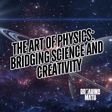
13: Math and Prison Riots (Interview with Frank Salas)
Frank Salas is an statistical exception, but far from an irreplicable result. Busted on the streets of Albuquerque for selling crack cocaine at 17, an age where many of us are busy honing the skills that we've chosen to master, and promply incarcerated in one of the myriad concrete boxes that comprise the United States penal system. There, he struggled, as most would in his position, to better himself spiritually or ethically, once even participating in a prison riot. After two stints in solitary confinement, he did the unthinkable: he imagined a better world for himself. One where it was not all him versus the world. With newfound vigor, he discovered what was there all along: a passion for mathematics and the sciences. After nine years of hard time he graduated to a halfway house. From there, we attended classes at community college, honing his skills using his second lease on life. That took him on a trajectory which developed into him working on a PhD in electrical engineering from the University of Michegan. We're talking, of course, about Frank Salas; a man who is living proof that condition and destiny are not forced to correlate, and who uses this proof as inspiration for many in the halway house that he once roamed. So who is he? What is his mission? And who is part of that mission? And what does this have to do with Maxwell's equations of electromagnetism?
---
This episode is sponsored by
· Anchor: The easiest way to make a podcast. https://anchor.fm/app
Support this podcast: https://anchor.fm/breakingmathpodcast/support



















